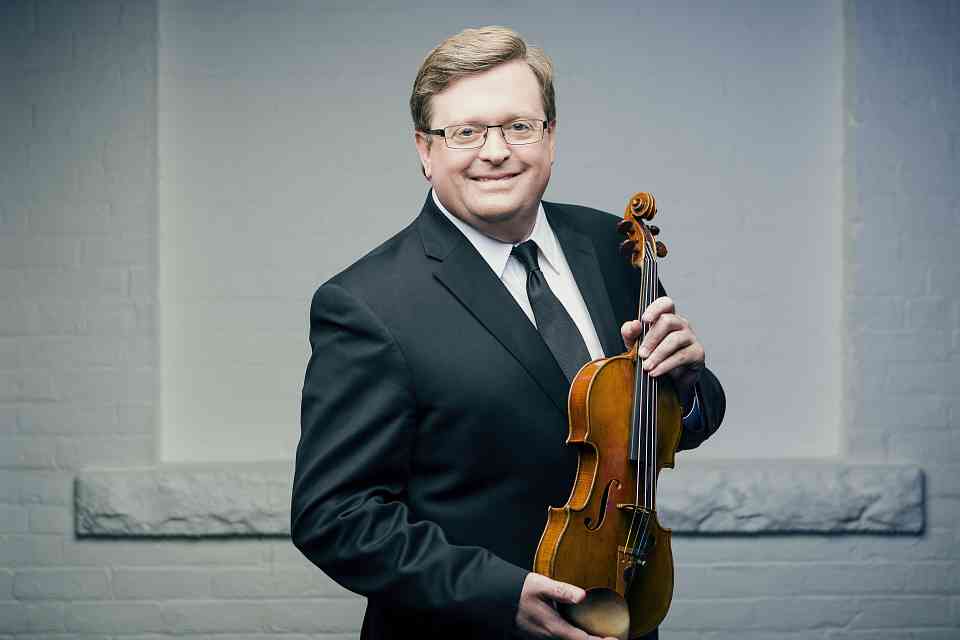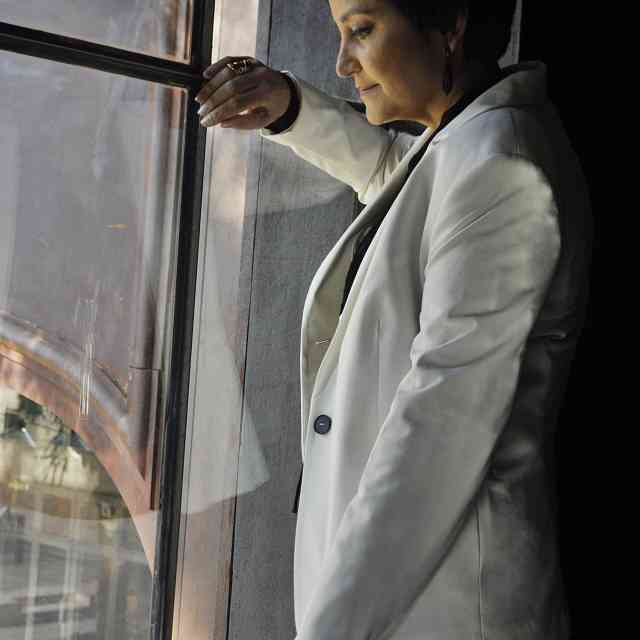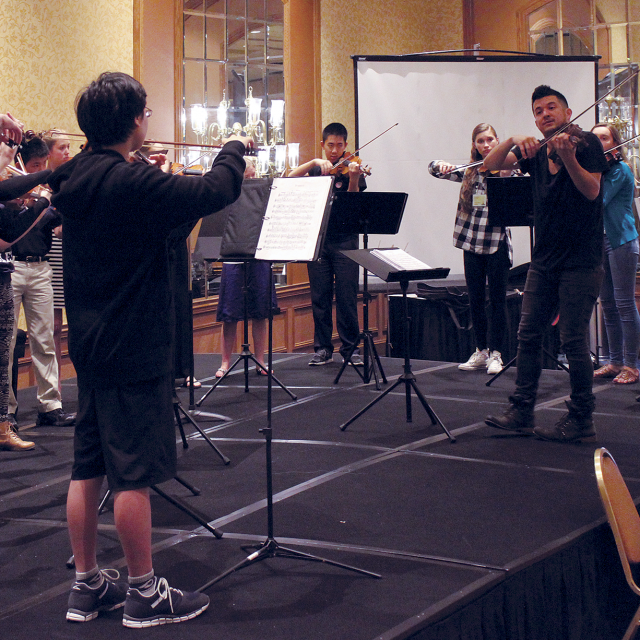
Martin Beaver
Attendees at the upcoming 2018 SAA Conference will have the pleasure and privilege of meeting and observing renowned Canadian violinist Martin Beaver, who will be conducting a violin masterclass.
Martin was first violin of the world-renowned Tokyo String Quartet from June 2002 until its final concert in July 2013. As such, he appeared to critical and public acclaim on the major stages of the world. His concerto and recital appearances span four continents, while his chamber music performances include collaborations with such eminent artists as Leon Fleisher, Pinchas Zukerman, Lynn Harrell, Sabine Meyer, and Yefim Bronfman. Martin is proud to be a founding member of the Montrose Trio with pianist Jon Kimura Parker and cellist Clive Greensmith.
Following his early studies with Claude Letourneau and Carlisle Wilson in his native Winnepeg, Martin was a pupil of Victor Danchenko, Josef Gingold, and Henryk Szeryng. He is a laureate of the Queen Elisabeth, Montreal, and Indianapolis competitions and has served on the juries of several important international competitions.
A devoted educator, Martin has conducted masterclasses throughout North and South America, Europe, Asia, and Australia. He has held teaching positions at the Royal Conservatory of Music, the University of British Columbia and the Peabody Conservatory. More recently, he served on the faculty of New York University and as artist in residence at the Yale School of Music, where he was awarded its highest honor, the Sanford Medal. He joined the faculty of the Colburn Conservatory of Music in Los Angeles in August 2013 as professor of violin and co-director of string chamber music studies.
How would you describe the role your parents played in your early music education?
I started to play the violin at the age of four, so you can imagine that my parents’ role in my early education was a large one. Even before my elder brother and I first picked up violins, there was always plenty of singing in the house and in the car. Also, my parents would play plenty of records (showing my age, here) and I became acquainted with a lot of classical music in different forms (concerti, symphonies, etc.). Apparently, my favorite was the Beethoven Violin Concerto which spurred me on to ask for a violin at a young age. Certainly, our household was very musically aware.
Professionally speaking, my parents were language teachers. However, my parents had been to some extent educated in music. My father had played the violin, viola, and piano as a youngster and my mother had studied the piano. My father played the organ at a church in his adult years (and still does to this day). He also directed choirs at his school and both my parents were involved in directing plays and musicals at their school.
I seem to recall that both my parents were “practice parents,” certainly in the early stages. It was certainly an advantage that my brother and I could work on pieces and play them through with my father, either playing his viola or the piano.
I would say that my parents’ role in my early music education was to foster great enthusiasm for the music along with a healthy respect for organization and the value of regular and concentrated practice. In other words—a very solid grounding!
What stands out in your memory about your violin lessons with your first teachers, Claude Letourneau and Carlisle Wilson?
I confess I don’t remember much about Mr. Letourneau since I was with him only for one year and I was so young. I do remember a nice feeling of community during the group lessons that he gave. Also, I remember hearing his daughter play the Mendelssohn Concerto while in her teens and thinking that the piece was as far away from my abilities as the moon! As it happened, I played the Mendelssohn at roughly the same age.
I spent a longer time studying with Mr. Wilson in Winnipeg. He was an excellent teacher—very warm and supportive. He was naturally a very humorous person and he used this gift to get his points across effectively, especially in my earlier years with him. Mr. Wilson stressed the importance of scales and etudes and we did plenty of both. In addition to solo repertoire, he also encouraged me in chamber music, first in duos with my brother, then in a piano-flute-violin trio with his two daughters. Incidentally, his daughter Keri-Lynn (the flutist) has gone on to an impressive career as a conductor.
Would you share an anecdote or two from your studies with Maestro Gingold?
Mr. Gingold was a warm and generous man whose love of the violin and of music was infectious to those around him. His qualities as a teacher are legendary as attested by the long list of wonderful violinists who studied with him. He also possessed an encyclopedic knowledge of all things musical.
Whenever Mr. Gingold would look at or be told a phone number, he would exclaim: “Archduke Trio and Schumann Piano Quintet,” meaning that the last four digits of the number were -9744 (the actual number for Yellow Cab in Bloomington, IN, by the way). Remembering opus numbers for phone numbers was a neat mnemonic device for him and he was very quick at it!
Another great skill Mr. Gingold often demonstrated in lessons was his ability to play a “violin reduction” of a piano or orchestra part with a student. He always found a way to emphasize important lines or themes in the score and it was a great way to cement a student’s knowledge of the score. Also, he was subtly able to guide a student’s phrasing in this way. I must admit that I often do this in my own lessons if a pianist is not present. I always aim to do it as beautifully as I remember Mr. Gingold did in my lessons.
What would you tell your younger self about time management and setting priorities?
Practice harder and practice smarter! Good habits become better ingrained at a younger age and bad habits are harder to get rid of as you get older.
How has being a parent shaped your understanding of your students?
I have two wonderful daughters, Sarah and Anna, and I love them both with all my heart. Their characters could not be more different. However, my wife and I have strived to instill in both of them the same values that we hold dear.
My students are all individuals—their physical types are different as are their ideal learning methods. What I have learned from being a parent to two very different daughters is that I must determine a student’s ideal manner of receiving and assimilating information even though I essentially want to impart the same musical and technical values that I consider important to each of them.
How do you want a student to feel as they leave your studio at Colburn after a lesson?
I want my students to feel inspired, energized and well-informed!
How do you guide your students in their practice? What practice skills do you help them to cultivate?
One of my end goals with any student (apart from building technique, repertoire, artistic sensitivity and communication skills) is that they ultimately become their own teacher. Therefore, I spend quite a bit of time discussing and demonstrating practice techniques with them. I encourage slow and relaxed practice so that they can analyze a problem, make corrections and gradually speed a passage up to normal tempo. In terms of analysis, we go over the various aspects in both hands/arms that can affect any given passage and the focus of mental energies.
I insist that they monitor their fatigue level and that regular breaks are taken to avoid physical strain. Other than the slow “nuts and bolts” kind of practice, I also encourage them to “perform” works or large sections of works to get a sense of musical continuity and flow, as well as to identify places worthy of further attention.
If you had not become a professional violinist, what career might you have chosen instead?
I have always felt that the violin “chose” me and I feel very fortunate that it did. Therefore, it is difficult to say what I might have chosen as an alternate career path. As a youngster, I dreamed of becoming a doctor or an airplane pilot (and sometimes a rock drummer). Of those three, I guess I still could realistically get my pilot’s license. . .
I believe I inherited an aptitude and interest in languages from my parents. I suppose I might have gone into some sort of career in languages. Since music is a language, one could say I did that anyway!
What are the sources from which you draw your inspiration at this stage in your career?
I must say I draw great inspiration from my work as a teacher, not only with my own students at Colburn but also with those I meet in masterclasses and workshops. I consider it a great privilege to be passing down the knowledge that I have acquired over several decades of performing and to be able to open the eyes, ears and hearts of young musicians to our great art. Somehow, I inevitably learn from them as well.








Comments